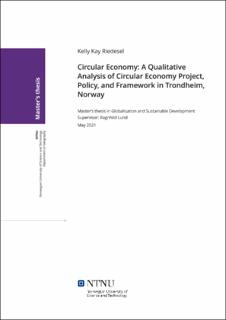Sammendrag
The topic of “Circular Economy” has been making its way around Europe since the European Union published Closing the loop: New Circular Economy Package in 2015, where they stated goals for creating a more circular economy in the EU. While Norway is not in the EU, they often follow the EU’s footsteps regarding initiatives related to the SDGs. Many countries and cities have begun to publish roadmaps and goals relating to a circular economy. Norway has yet to publish a road map or set any goals, policy, or framework relating to the circular economy. My research looks at what is happening in Trondheim currently and what is coming to help grow Trondheim’s circular economy. The research is presented through interviews with people working in the field, two case studies, and a literature review. The data collected was analyzed using the 5’s, reduce, reuse, refuse, repair, and recycle to connect my finding with the circular economy. The result presents a need for change within the city of Trondheim, and that now is the time for change because they are years behind in circular economy efforts compared to the EU. Trondheim can look to what other cities such as Helsinki or Amsterdam have done within their local policy and framework to support circular economy initiatives. It is found that many of the social aspects of CE can be solved with policy changes and the availability of CE-related initiatives, as well as a societal push. The research concludes that policies and frameworks are being created in the city, such as a circular manifesto in its beginning phases and initiatives from the chamber of commerce. Things are beginning to pick up in Trondheim, and we can expect to see a circular increase in the next 3-5 years if the right policy and framework are put in place.
